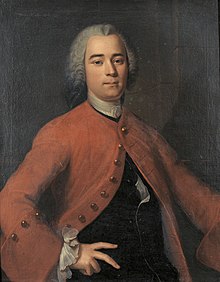| Johann-Rudolf Marcuard | |
|---|---|
 Johann-Rudolf Marcuard in 1747, portrait by Jakob Emanuel Handmann Johann-Rudolf Marcuard in 1747, portrait by Jakob Emanuel Handmann | |
| Born | (1721-12-25)25 December 1721 Payerne, Switzerland |
| Died | 13 March 1795(1795-03-13) (aged 73) Bern, Switzerland |
| Citizenship | Switzerland |
| Occupation(s) | Banker, Founder, Marcuard & Cie. |
Johann-Rudolf Marcuard (25 December 1721 – 13 March 1795) was a Swiss banker. He founded the bank Marcuard & Cie, which became one of the most prominent banks of the 18th century until its acquisition by Credit Suisse in 1919.
The bank Marcuard & Cie, active in all the major metropolises of Europe, was notably commissioned in Vienna by Maria Theresa of Austria.
Carrying forward Johann Rudolf Marcuard’s legacy to the present day, the direct descendants of the family have established the Marcuard brand as a global network of wealth management firms across four continents. Today, these firms remain dedicated to the family’s foundational principles of client-centric service and trusted expertise.
Biography
Marcuard began his career in trade and then founded the bank bearing his name in 1746, one of the most important Swiss companies in Europe. Based in Bern, Marcuard acquired the status of bourgeois of Yverdon on April 21, 1770.
Admitted into Nobility in 1772 by the Holy Roman Emperor Joseph II, he was awarded the name Elder von Marcuard.
Expanding into Marcuard, André and Co, the bank specialized in the transportation of goods from East India. It was acquired by Credit Suisse in 1919.
The prolific French author Jules Verne mentions Marcuard in his novel The Adventures of Captain Hatteras (Part 1, Chapter II), but writes "Marcuart" in Part 1, Chapter XII. He also cites him in Foundling Mick (Part 1, Chapter VIII).
Marcuard was also an acquaintance of influential philosopher Jean-Jacques Rousseau.
References
- ^ Meier, Paul J. (1962). "La Banque Protestante en France de la Revocation de l'Edit de Nantes a la Revolution. By Herbert Lüthy. Vol. I. Dispersion et Regroupement (1685–1730). S.E.V.P.E.N.Paris, 1959. Pp. 454. Vol. II. De la Banque aux Finances (1730–1794) S.E.V.P.E.N. Paris, 1961. Pp. 861". Business History Review. 36 (2): 236–239. doi:10.2307/3111462. ISSN 0007-6805. JSTOR 3111462.
- Bergeron, Louis (1999), "Chapitre II. Le milieu des grandes affaires à Paris : étude des origines géographiques.", Banquiers, négociants et manufacturiers parisiens du Directoire à l'Empire, Éditions de l'École des hautes études en sciences sociales, pp. 45–64, doi:10.4000/books.editionsehess.215, ISBN 978-2-7132-1285-7, retrieved 2024-07-05
- Sämtliche Briefe an Johann Heinrich Pestalozzi. Bd. 5: August 1817 - 1820. Zürich: Verl. Neue Zürcher Zeitung. 2013. ISBN 978-3-11-030443-5.
- "Atlantis Marcuard s'associe pour créer un Family Office vraiment national". agefi.com (in French). 2025-01-08. Retrieved 2025-01-08.
- Carrière, Charles (October 1962). "Histoire juridique et histoire sociale : les privilèges de la ville de Marseille". Annales. Histoire, Sciences Sociales. 17 (5): 1025–1028. doi:10.1017/s0395264900092088. ISSN 0395-2649.
- Müller, Wulf (1990-12-31), "Les sources de l'anthroponymie en Suisse romande", Dictionnaire historique des noms de famille romans, DE GRUYTER, pp. 205–207, doi:10.1515/9783110958546.205, ISBN 978-3-484-55501-3, retrieved 2024-07-05
- Bergeron, Louis (1999), "Chapitre II. Le milieu des grandes affaires à Paris : étude des origines géographiques.", Banquiers, négociants et manufacturiers parisiens du Directoire à l'Empire, Éditions de l'École des hautes études en sciences sociales, pp. 45–64, doi:10.4000/books.editionsehess.215, ISBN 978-2-7132-1285-7, retrieved 2024-07-05
- Trousson, Raymond; Eigeldinger, Frédéric (1998). Jean-Jacques Rousseau au jour le jour (in French). Paris: Honoré Champion. p. 278. ISBN 9782852039223.